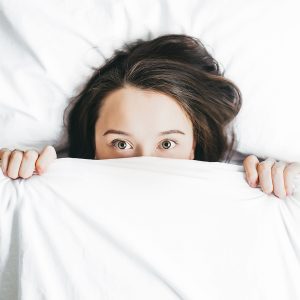Insomnia is a common affliction causing one third of people to lose sleep. Ten to fifteen percent of those affected experience insomnia that is extreme enough to impact daily life. Sleep affects all major systems of the body and in turn how the body systems are functioning affects sleep. Traditional Chinese Medicine (TCM) pays very close attention to how the body works as a whole to gain greater insight into the underlying cause of insomnia.
Insomnia comes in many forms including difficulty falling asleep, inability to stay asleep, waking up too early or sleep that is not restful. Insomnia may be a temporary issue created by life circumstances or it may be a chronic condition influenced by factors such as age, ongoing stress or digestive issues. Younger people typically have trouble falling asleep while older adults have trouble staying asleep.
In TCM there are many underlying causes of insomnia and the ones I treat in clinic frequently are due to Kidney yin deficiency, Spleen qi deficiency and Liver qi stagnation. Left untreated these may lead to heat or blood deficiency.
Kidney yin deficiency with empty heat is a common condition for people in their forties and beyond.
In addition to the aging process Kidney yin may also be depleted by overwork, excessive exercise and lack of rest. Kidney energy represents the water element that helps to keep the fire element of the Heart in check. If the Heart fire blazes out of control it will further deplete Kidney yin generating what is called empty heat. This heat prevents the Heart from being anchored or grounded.
Insomnia due to Kidney yin deficiency is typically chronic with frequent waking throughout the night. Hot flashes and night sweats may also cause waking. In the daytime there may be dizziness, hot flashes in the late afternoon into evening, a mild feeling of uneasiness and heart palpitation as well as a dry mouth and warm hands and feet.
Spleen qi deficiency and Heart blood deficiency may be due to irregular eating, poor food choices and too much raw or cold food. Overwork, overthinking or prolonged illness may also diminish Spleen qi. In TCM the Spleen plays a key role in converting food to blood and over an extended period of time Spleen qi deficiency will lead to Heart blood deficiency.
People who suffer from insomnia due to Spleen qi and Heart blood deficiency will usually have difficulty falling asleep, typically from an inability to quiet the mind, and once asleep may experience many dreams. This is because there is not enough blood to keep the shen settled and allow restful sleep. During the day time there may be poor appetite, poor memory and fatigue.
Liver qi stagnation creating heat or fire is often due to unresolved frustration, anger, resentment, and repressed emotions. Qi stagnation impedes blood circulation which will create heat that will eventually impact the energy of the Heart. This heat will prevent the mind from being calm and create an unsettled shen (spirit) leading to fitful sleep.
Insomnia due to Liver qi stagnation manifests as difficulty falling asleep and waking repeatedly. Insomnia will be worse during times of stress. During the day there may be depression, irritability, outbursts of anger, headaches, shoulder and neck tension and in some cases anxiety with heart palpitations.
These are just a few examples of TCM diagnoses of disturbed sleep. Acupuncture gets to the root cause of insomnia and it may take a few treatments to see improvement. Acupuncture points are selected to boost blood and yin, cool any heat or fire and clear energy blockages to calm the mind. An acupuncture treatment calms the mind by relaxing the nervous system, getting us back into parasympathetic (rest and digest) mode. Parasympathetic mode allows proper healing, recovery and deep, restful sleep. When there is too much stress, either mental, emotional or physical, the body releases stress hormones such as cortisol or adrenaline. These hormones keep us in the sympathetic (fight or flight) mode regardless of whether any real threat is present.
In addition to acupuncture treatments it is important that sleep hygiene is in check to ensure conditions are ideal for proper shut eye:
- Avoid caffeine later in the day and ensure adequate water intake 2 hours before bedtime to eliminate the need to wake for the toilet.
- Room temperature should not be too warm, 16°C to 19°C is ideal
- Go to bed and wake at the same time each day to create a consistent sleeping habit
- Avoid screens a couple of hours before bed. TV, computer, e-reader, phones and tablets emit a light that is disruptive to our circadian rhythms.
- Ensure the room is dark with blackout curtains/blinds if necessary and remove all sources of light including bright alarm clock displays.
- And speaking of circadian rhythms, ensuring adequate exposure to natural sunlight daily also provides signals to our body to ensure we are functioning in the right wake/sleep cycle.
If you’re struggling with insomnia contact Jeanette Turnbull, R.Ac to learn how acupuncture may help you get a good nights sleep.
Click here to book an appointment:
https://thesageclinic.janeapp.com/#/staff_member/23
